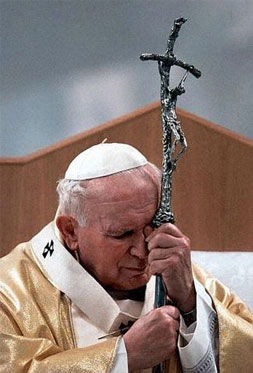By Elizabeth Birge
Religion News Service
Two days after the 2004 presidential election, William Portier ran into an acquaintance at the grocery store.
The man was a strong opponent of the Iraq war and had demonstrated against it, but when it came time to vote, he chose not to.
“He said he couldn’t vote for (George) Bush because of the war, and he couldn’t vote for (John) Kerry because of his support for abortion,” said Portier, a professor of religious studies at the University of Dayton in Ohio.
Pope Benedict XVI arrives for his first visit in the United States this month with the country once again in the middle of a heated presidential election.
And while no one believes the pope will speak directly about the November elections during his visit, the tone and focus of his speeches could help influence millions of Catholic voters, many of whom live in key swing states such as Ohio, New Jersey and Pennsylvania, which holds its primary next month.
If Benedict speaks pointedly about abortion, it could give a lift to Republican Sen. John McCain, even though McCain is at odds with the church on at least one key issue: embryonic stem cell research.
“John Paul II made it quite clear that the litmus test for Catholic orthodoxy was abortion, with sexuality not being far behind,” said Mary E. Hunt, of the Women’s Alliance for Theology, Ethics and Ritual. “But I’m not sure how Cardinal Ratzinger/Benedict will go on about that in the public arena in the states, whereas John Paul II had no compunction about bringing it up. He put it front and center like red meat.”
But if Benedict also focuses more on world peace, poverty and church positions against capital punishment and punitive immigration laws, then many Catholics may consider supporting whichever Democrat gets the nomination, experts say.
If Sen. Barack Obama or Sen. Hillary Clinton can make even small inroads among the deeply religious Catholics who have voted Republican in recent elections, they could improve their chances of winning key swing states.
Theologians agree that this election will be less rancorous among Catholics than in 2004 because there is no Catholic candidate and because the debate over gay marriage is at the state level rather than national, as it was in 2004.
During the 2004 presidential election, the U.S. Catholic bishops debated at great length whether a Catholic politician who supports abortion rights — such as Kerry — should be denied Communion. In the end, the bishops put the onus on dissenting lawmakers, and left it to individual bishops to decide whether to deny Communion.
Also expected to be missing this year is heated national discussion on same-sex marriage. A constitutional amendment to ban same-sex marriage supported by the Bush administration — and the Catholic Church — was defeated in the U.S. Senate in 2006. McCain voted against the amendment, which would have banned same-sex marriages.
As in elections past, Catholic voters may struggle to find a clear political home in either party.
Every four years, the U.S. Conference of Catholic Bishops publishes a document called “Forming Consciousness for Faithful Citizenship.” The most recent issue was published last fall, but its advice isn’t cut-and-dried.
The church considers abortion an “intrinsic evil” — both a moral evil and against the will of god — along with euthanasia, cloning, legalizing same-sex marriage and embryonic stem cell research. Some Catholic theologians hold that if a political candidate supports such an “intrinsic evil,” Catholics simply cannot vote for him or her.
Clinton and Obama support abortion rights and embryonic stem cell research. And although McCain supports embryonic stem cell research, he agrees with church on abortion and same-sex marriage.
“The issue for Catholics is whether they agree with the teachings of the church on the question of the killing of innocent life,” said the Rev. Richard John Neuhaus, editor of First Things, a conservative journal of religion, culture and public life. “The protection of life takes priority over a whole range of issues that reasonable people can disagree about.”
The Faithful Citizenship document, however, states that if a candidate opposes an intrinsic evil but is indifferent to other important church issues — such as capital punishment, reducing poverty, ending the war in Iraq — a Catholic voter could support another candidate for “morally grave reasons” and not be compromised in the eyes of the church.
“In other words,” said the Rev. Thomas Reese, a senior fellow at Woodstock Theological Center at Georgetown University, “you’ve got a pro-choice candidate running for office and (a voter says), `I think there are morally compelling reasons why I should vote for this candidate’ because, for example, this candidate is in favor of health care for children and treatment for pregnant women. That would be a compelling reason.”
What the fall election will be more about is “can good Catholics vote for Clinton or Obama, and it seems to me they can,” said Portier of the University of Dayton.
Americans looking for direction on Benedict’s public policy priorities may find clues when he addresses the United Nations.
“His political agenda is big and expansive and very much focused on issues of peace, justice and human rights and within human rights he sees the right to life being the pre-eminent human right,” said Reese.
“To paint him as a one-issue person is to close your eyes to all the issues that he’s concerned about.”
(Elizabeth Birge is a staff writer for The Star-Ledger of Newark, N.J.)
Copyright 2008 Religion News Service. All rights reserved. No part of this transmission may be distributed or reproduced without written permission.
More from Beliefnet and our partners

